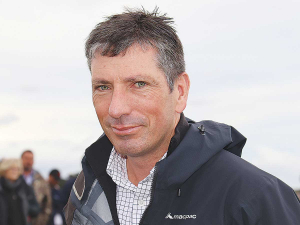Simon Upton urges cross-party consensus on New Zealand environmental goals
Parliamentary Commissioner for the Environment Simon Upton is calling for cross-party consensus on the country's overarching environmental goals.
 Beef+Lamb chief executive Sam McIvor says there is no disincentive in the updated climate change policy to stop the conversion of productive and sustainable pastoral agriculture to exotic plantation forestry for carbon farming.
Beef+Lamb chief executive Sam McIvor says there is no disincentive in the updated climate change policy to stop the conversion of productive and sustainable pastoral agriculture to exotic plantation forestry for carbon farming.
Beef + Lamb New Zealand (B+LNZ) believes the Emissions Trading Scheme (ETS) will see huge swathes of productive farming land converted into trees for carbon farming.
It says there is no disincentive in the updated climate change policy to stop significant land use change away from productive and sustainable pastoral agriculture to exotic plantation forestry for the purpose of carbon farming. The red meat lobby claims this failure will take the focus away from actually reducing fossil fuel emissions.
B+LNZ chief executive Sam McIvor says his organisation is concerned by the lack of government action to limit the amount of carbon farming available through the ETS to offset fossil fuel emissions.
“The Government has told us there are provisions in the legislation to limit the ability of fossil fuel polluters to offset their emissions by planting exotic trees,” he says.
“However, our analysis indicates the Climate Change Response Act’s weak provisions do not provide the robust safeguards necessary.”
McIvor claims, as it currently stands, the Emissions Trading Reform Bill will not achieve its stated aim of reducing emissions, but will simply lead to increased offsetting.
“We are alarmed the Government is rushing through these reforms, which will have significant consequences for sheep and beef farmers, rural communities and future export revenue.”
He says B+LNZ is seeking changes to the legislation so that carbon farming and essentially fossil fuel emissions can be limited.
“This will provide some safeguards to protect our sheep and beef farmers and rural communities from the risk of large-scale land use change as the carbon price is allowed to rise through these changes to the ETS.
“It is vital there are safeguards in place to prevent fossil fuel emitters from having a carte blanche ability to offset all of their pollution on our landscapes, at the expense of a sector that is worth 16% of New Zealand’s exports and supports about 92,000 jobs.”
McIvor says B+LNZ is also seeking legal advice on the adequacy of existing provisions in the Climate Change Response Act.
B+LNZ’s analysis indicates that since 2019 about 70,000 hectares of productive sheep and beef land has been, or is in the process of being, converted into forestry.
“This is approximately 13 times more than the average annual amount of afforestation in New Zealand over the past five years. B+LNZ believes carbon related investment is a significant part of this.”
McIvor says as the carbon price increases, the rate of forestry conversion is likely to accelerate and spread around the country.
“This is supported by modelling by the Parliamentary Commissioner for the Environment who, last year, estimated 5.4 million hectares of land would need to be converted into forestry to meet the Government’s Zero Carbon Bill targets,” he explains.
“This about 60% of productive sheep and beef land and, as a result, the commissioner recommended halting the use of forestry to offset fossil fuel emissions.”
Environment Canterbury, alongside industry partners and a group of farmers, is encouraging farmers to consider composting as an environmentally friendly alternative to offal pits.
A New Zealand dairy industry leader believes the free trade deal announced with India delivers wins for the sector.
The Coalition Government will need the support of at least one opposition party to ratify the free trade deal with India.
Primary sector leaders have welcomed the announcement of a Free Trade Agreement between India and New Zealand.
At Pāmu’s Kepler Farm in Manapouri, mating has wrapped up at the across-breed Beef Progeny Test.
More than 150 people turned up at Parliament recently to celebrate the 20th anniversary of Horticulture New Zealand (HortNZ).

OPINION: The release of the Natural Environment Bill and Planning Bill to replace the Resource Management Act is a red-letter day…
OPINION: Federated Farmers has launched a new campaign, swapping ‘The Twelve Days of Christmas’ for ‘The Twelve Pests of Christmas’ to…